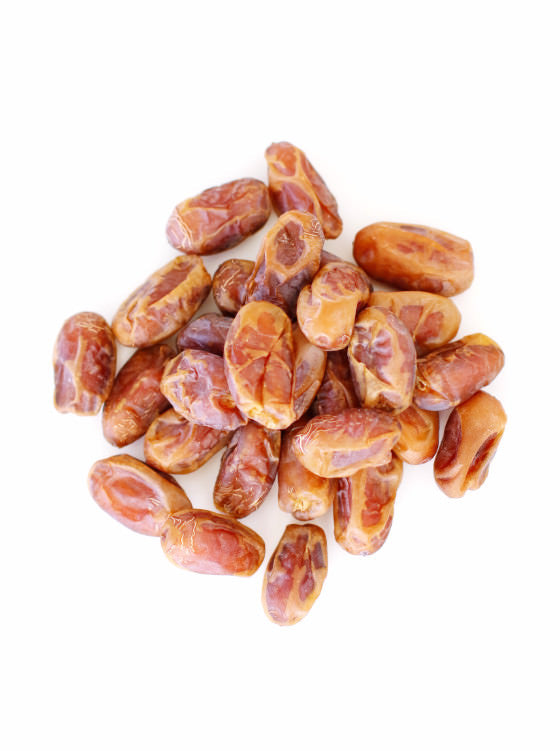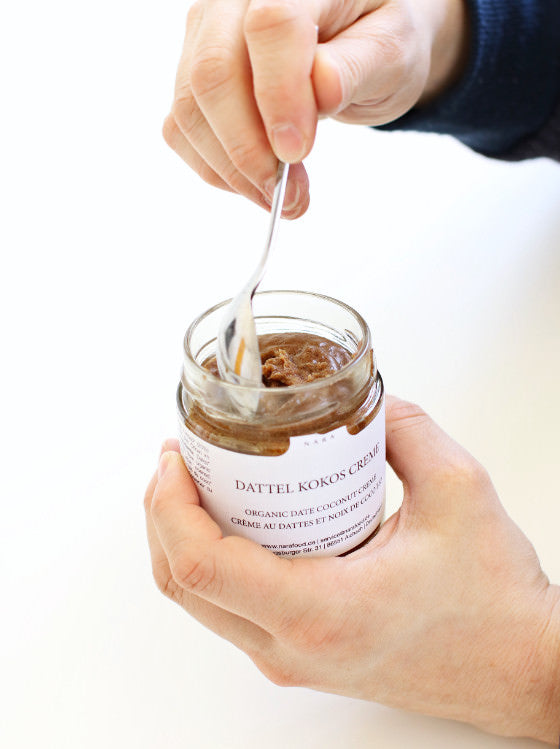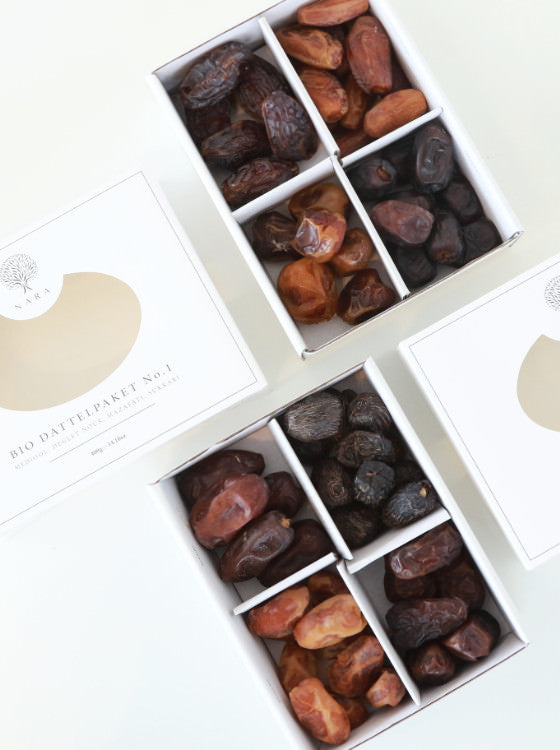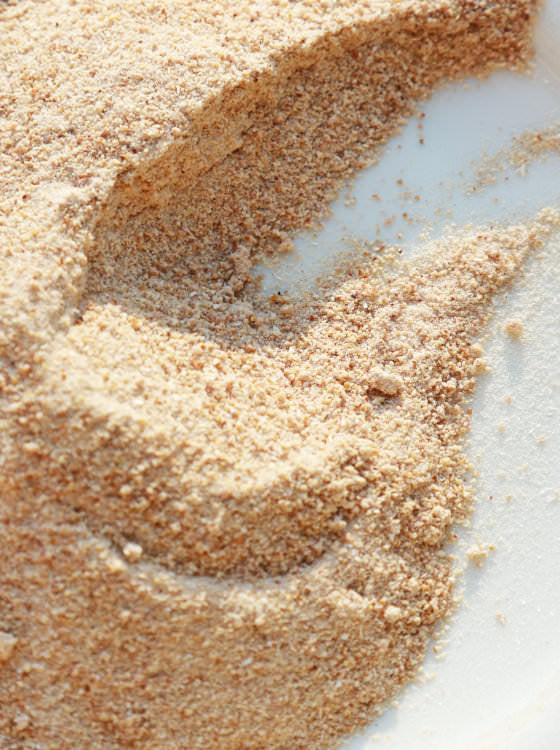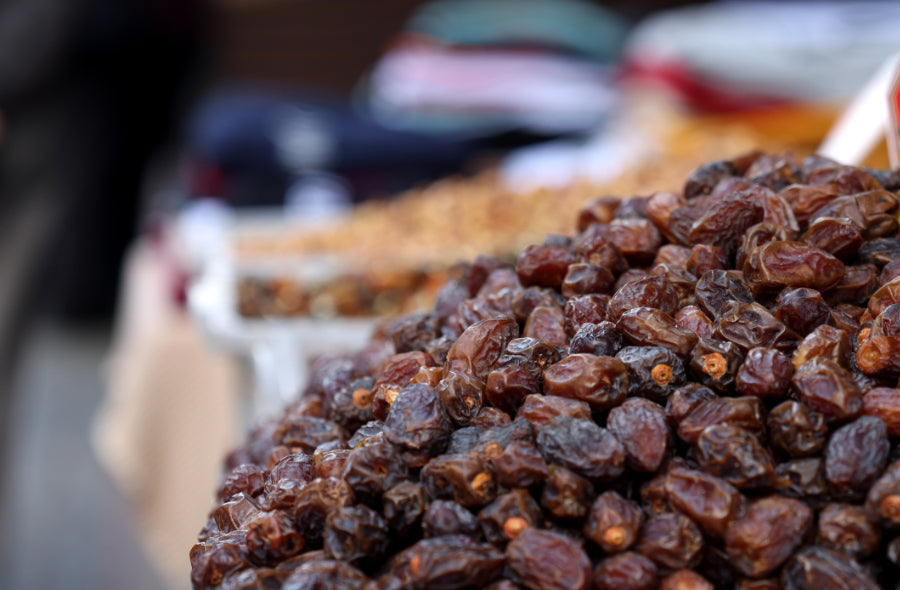Perhaps you've heard that fiber is good for your body? This is true in most cases. However, we want to be wary of extreme generalizations such as "dates are the best source of fibre" and are therefore shedding light today on whether there are facets worth knowing about, which everyone can evaluate individually - depending on their health requirements.
We take a look at this:
- what you should know about the fiber in dates,
- why and how you can include fiber in your diet.
Looking at values in relation
Depending on the variety, dates contain around 5 - 8 grams of fiber per 100 g. In relation to this, strawberries have around 2 g of fiber per 100 g and grapes 1.6 g per 100 g. Dried apricots or dried plums, on the other hand, contain around 18 g of fiber per 100 g. Dates therefore have a significant amount of fiber, but are not the fruits with the most fiber in comparison.
Do dried dates have more or less fiber than fresh dates?
Dried dates contain more fiber than fresh dates. The reason for this is the water content: dried dates have a significantly lower water content than fresh dates, which means that the concentration of nutrients and fiber per gram is higher. Fresh dates contain around 3 - 4 g of fiber per 100 g.

Indigestible and indispensable:
Dietary fibers are indigestible plant components found in many foods such as fruits, vegetables, whole grains, legumes, nuts and seeds. Unlike carbohydrates, proteins or fats, fiber does not provide any real energy as it cannot be broken down by the human digestive system. Nevertheless, they are considered an essential part of a healthy diet.
Possible positive effects on the body
Some of the fiber in dates is soluble, including pectin, oligofructose and inulin. Soluble fiber forms a gel-like substance in water - i.e. also in the digestive tract.
- Soluble fibres slow down the absorption of sugar into the bloodstream and thus help to stabilize blood sugar levels.
- They bind bile acids and cholesterol in the intestine, which can lower blood cholesterol levels.
- They act as prebiotics and thus promote the growth of healthy intestinal bacteria.
Dates also contain fiber that is insoluble in water, which can benefit your digestion and your body: for example, cellulose and lignin (as well as hemicellulose, which is only partially soluble).
- Insoluble fibers increase the volume of stool and thus stimulate intestinal activity, which prevents constipation. Find out more about how dates can help with constipation here.
- They help to transport waste efficiently through the intestines and can therefore support your intestinal health.
How much fiber can we get from dates?
The German Nutrition Society (DGE) recommends that adults consume at least 30 g of fiber per day.
"" You can usually achieve this 30 g through a balanced diet, for example by focusing on wholegrain products, fruit, vegetables, pulses and nuts.
A portion of 3 - 5 dates (about 30 - 50 g) provides you with 2 - 4 g of fiber. This is an ideal amount to enrich your daily fiber requirement with a sweet "desert fruit snack". Please do not try to cover your entire fiber requirement with dates. Why?
- Please note that dates tend to be high in calories, so we recommend eating them in moderation.
- Dates also contain a lot of fructose (fruit sugar), which people with diabetes or fructose intolerance should be aware of.
Important tips
If you are planning to eat more fiber, do not make extreme changes to your diet in one day, but increase the amount of fiber slowly and drink plenty of fluids. If in doubt, talk to a doctor or nutritionist about your medical reasons first so that you can keep a responsible eye on all vitamins and nutrients in a healthy way.
"" Dietary fiber should be consumed with caution, especially in the case of irritable bowel syndrome or intestinal diseases (e.g. Crohn's disease, ulcerative colitis) as well as after surgery or with a sluggish bowel, as it can aggravate symptoms such as bloating or constipation. Children, older people, underweight people and people with mineral deficiencies should also ensure a moderate intake, as fiber can inhibit the absorption of nutrients.

Integrate fiber into your everyday life: Dates as a sweet addition
Here are some simple tips on how you can increase your fiber consumption:
- Start the day with a high-fiber breakfast, for example oatmeal with blueberries and nuts.
- Eat wholemeal products such as wholemeal bread, pasta or rice more often.
- Be it in vegetable lasagna or in a quiche: Add more legumes like lentils, beans or chickpeas to your favorite recipes.
- Instead of snacking on highly processed snacks such as potato chips or jelly babies, you can buy nuts, seeds or dates.
We hope you enjoy indulging
Whether dried or fresh: as part of an already high-fiber diet, you can treat yourself to dates as a delicious extra, like the icing on the cake. Always make sure you eat them in moderation and according to your body's individual needs - that way you can make the most of the benefits of these sweet fruits and enjoy them to the full.
Enjoy, your Narafood team!

